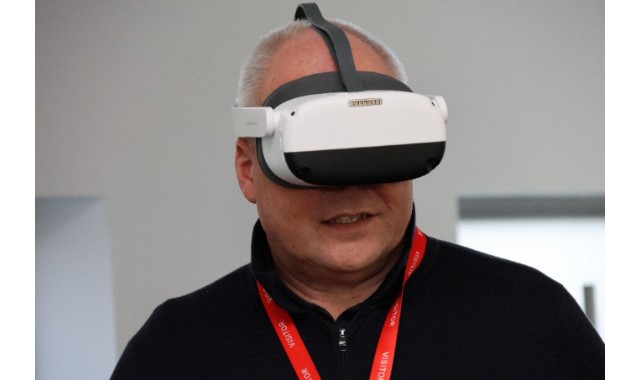STUDENTS are being taken virtually to their future workplaces thanks to a multi-million pound project which puts the latest technology at the heart of their learning.
The next generation of health workers are being transported to the scenes of car crashes, drug overdoses and commonplace homes so they can assess a range of scenarios they will have to deal with for real.
Health and social care students are also working with AI mannequins which breathe, speak and respond to questioning.
Budding engineers can access the workings of a hydrogen electrolysis machine or the top of a wind turbine, places too dangerous to reach as they develop their skills.
New skills bays also allow students a first taste of the latest renewable energy equipment including EV chargers, solar panels and air and ground source boilers.
The brave new world of education was explained to guests at a special event hosted by Darlington College, the lead partner in the Tees Valley Local Skills Improvement Plan, an initiative also led by the North East Chamber of Commerce and the Department for Education.
Also involved in the project are Middlesbrough College, Hartlepool College, Hartlepool Sixth Form, Redcar and Cleveland College, Stockton Riverside College, ETC Group and Learning Curve.
Research began in 2022 as 5,000 local employers across a diverse range of sectors were asked about the workforce and the skills they needed to flourish.
Darlington College assistant principal Alan Jones told guests: “What came back were issues of recruitment and retention, communication and digital skills and that employers can’t wait for our students to join their businesses.
“Green energy for construction and manufacturing jumped out, as did health and social care, business and professional services and transferable skills, such as communications and digital. The Local Skills Improvement Fund provided the finance but it has not been a case of just spending money for money’s sake it has been targeted.”
NECC business engagement manager Bev Brown said: “We have worked with local employers and carried out extensive research around skills to establish where the gaps are and what employers are looking for currently and in the future. Today is an opportunity to showcase all the fabulous curriculum and facilities that have been implemented via LSIP and LSIF.”
Guests toured Darlington College’s new health hub where health and social care students can gain hands-on experience of a nursing home, hospital ward and GP surgery, interacting with sophisticated AI mannequins to hone their skills.
They were also shown renewable energy skills bays where students will master the ability to fit and maintain everything from EV charging points to hybrid boilers.
They were also encouraged to try virtual reality headsets which use gaming technology and bespoke programming to transport students safely to real-life scenarios.
Andi Liddell, of the Middlesbrough-based interactive 3D content creators Animmersion, said the programmes had been designed with tutors around learners’ and employers’ specific needs.
“It’s all about contextual learning, harnessing the skills burned deep into lecturers’ heads, to allow students to access areas they would not normally be able to reach safely at this stage,” he said.
He said they had used 360 degree and stereovision videos to recreate a host of real places and scenarios.
“So for healthcare students it could be an overdose victim in a grubby house, or a woman collapsed in a front garden surrounded by neighbours, a stroke or heart attack patient, or an asthma sufferer who has been returned to a home where the family smoke,” he said.
“With renewables they are able to get inside a hydrogen electrolyser to understand the hazards around creating hydrogen which they couldn’t do for real or with insulation retrofit they can do a complete energy assessment on homes ranging from old cottages and new builds to a 1970s semi-detached.”
